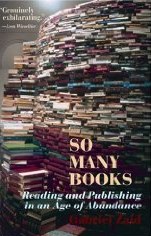So Many Books: reading and publishing in an age of abundance
Of all the many things you might observe about books today, one fact stands out: There are a lot of books. We have more books than anyone can read. I myself own more books than I can read. We have far too many books for our stores. We can’t come close to reviewing every new book, or to reading all the books that get great reviews.
Gabriel Zaid argues that this state of affairs is actually a very good thing.
It costs millions of dollars to make a film or mount an opera, but you can write and publish a book for a few thousand dollars. Zaid shows how this economic fact promotes tremendous diversity in books, and maintains diversity even in the face of publishing and bookselling businesses that would much prefer books to behave like movies. You can publish a book — any book — successfully and profitably if you can find a few thousand readers to whom the book is worth about 6 hours of minimum-wage work. That’s why our book world is rich, diverse, and hopelessly fragmented.
Zaid also considered the reader’s dilemma: we have so many wonderful books from which to choose, and a lifetime of reading might only allow us to read a few thousand. (Zaid suggests a thousand, but that’s too low: even a compensated dyslexic like me can manage about 450 volumes in a seven years.)
Zaid is interested in ebooks and hypertext, and does his best to estimate their impact on reading, writing, and publishing. He’s mistaken: he thinks links are merely a supplement to indexes, and doesn’t see that they’re the first new punctuation in ages and will prove at least as important to writing as the comma. In thinking about new media, Zaid ties himself to the bibliolaters and book collectors, the people who worry about missing the smell of the ink. But it’s an honest error, without malice, and essentially harmless. The discussion of the excess of books, and why this is not a cause for despair or an incentive for mergers, is invaluable.
